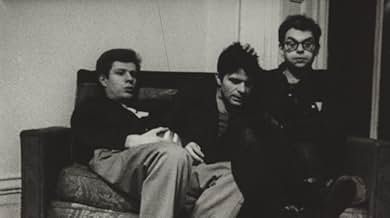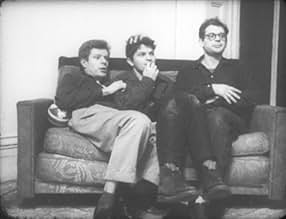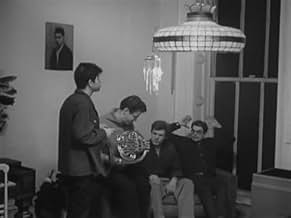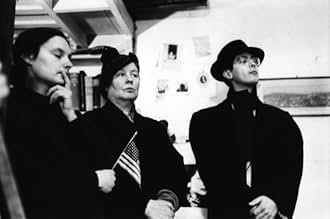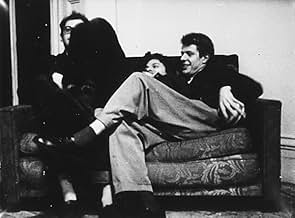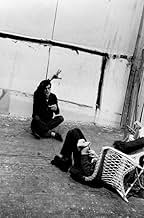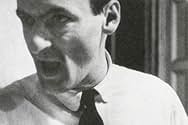अपनी भाषा में प्लॉट जोड़ेंA married couple vainly hopes that their irreverent beat poet friends will behave themselves when the bishop comes to visit.A married couple vainly hopes that their irreverent beat poet friends will behave themselves when the bishop comes to visit.A married couple vainly hopes that their irreverent beat poet friends will behave themselves when the bishop comes to visit.
- पुरस्कार
- कुल 1 जीत
Allen Ginsberg
- Allen
- (as Alan Ginsberg)
Delphine Seyrig
- Milo's Wife
- (as Beltiane)
Richard Bellamy
- Bishop
- (as Mooney Pebbles)
फ़ीचर्ड समीक्षाएं
A humorous almost innocent short film starring the Beat poets, alas not Kerouac but the narration which he wrote and speaks is beautiful and funny. In my innocence I was amazed to see the group passing around pot (*I know it was tobacco!) on camera. Thankfully this time capsule is available for viewing online (Open Culture) together with a clip of the poets visiting an East Side bar, filmed at the same time.
Various "Beat Generation" luminaries hang out in a New York apartment. I usually couldn't care less about the Beats, but this short film is fairly absorbing, thanks mostly to Jack Kerouac's vibrant narration. It makes me nostalgic for the '50s, and I wasn't even around back then.
"The first truly beat film" -Jonas Mekas
It is easy to say that Pull My Daisy is the epitome of "beat generation" cinema. It can also be said that Pull My Daisy was the first film to practice the radical beliefs of "The New American Cinema Group". After all the historical and analytical nonsense is done, you are still left with a film that is passionate, personal, and most importantly- a film that entertains while expanding your understanding of art and the artist within a movement.
Pull My Daisy is based on the third act of a play written by beat generation mastermind Jack Kerouac untitled The Beat Generation (which was changed because MGM had the copyright to Beat Generation because of a low budget B-movie made by the studio in the late 50's). The new title was based on a poem written by Kerouac, poet Allen Ginsberg, and Neal Cassady in a be-bop jazz meditation (jazz and meditation- two important aspects of the film!) The film takes place in a New york apartment and never leaves the apartment except in one dream sequence. The cast of characters reads like a who's who of the beat generation: Allen Ginsberg, Gregory Curso, Peter Orvolosky (all of which retain their real names during the film). The film itself is beautifully narrated by Keroauc with a subtle be bop jazz soundtrack. The cast acts like themselves- substance abusing philosophers who sit in lotus positions contemplating life and art. The story picks up with the entrance of a bishop with his mother and sister. He is an outsider who enters this world of poets and must focus on their neo-buddhist rantings of "is baseball holy...etc.".
Where other films of "The New American Cinema" seem detached and unaccessible to the public- Pull My Daisy is an honest and almost affectionate portrait of the beat generation. This is the one film (with a possible inclusion of Cassavette's Shadows) of the movement that expands past the area of modernist-artistic riff-raff and tells a true story that is virtuous and right (yet highly symbolic and leaves the viewer questioning many aspects of life). Pull My Daisy is the shining star of the cannon of "The New American Cinema" and is a film that should forever be preserved for generations of alienated film makers and cinema fans.
It is easy to say that Pull My Daisy is the epitome of "beat generation" cinema. It can also be said that Pull My Daisy was the first film to practice the radical beliefs of "The New American Cinema Group". After all the historical and analytical nonsense is done, you are still left with a film that is passionate, personal, and most importantly- a film that entertains while expanding your understanding of art and the artist within a movement.
Pull My Daisy is based on the third act of a play written by beat generation mastermind Jack Kerouac untitled The Beat Generation (which was changed because MGM had the copyright to Beat Generation because of a low budget B-movie made by the studio in the late 50's). The new title was based on a poem written by Kerouac, poet Allen Ginsberg, and Neal Cassady in a be-bop jazz meditation (jazz and meditation- two important aspects of the film!) The film takes place in a New york apartment and never leaves the apartment except in one dream sequence. The cast of characters reads like a who's who of the beat generation: Allen Ginsberg, Gregory Curso, Peter Orvolosky (all of which retain their real names during the film). The film itself is beautifully narrated by Keroauc with a subtle be bop jazz soundtrack. The cast acts like themselves- substance abusing philosophers who sit in lotus positions contemplating life and art. The story picks up with the entrance of a bishop with his mother and sister. He is an outsider who enters this world of poets and must focus on their neo-buddhist rantings of "is baseball holy...etc.".
Where other films of "The New American Cinema" seem detached and unaccessible to the public- Pull My Daisy is an honest and almost affectionate portrait of the beat generation. This is the one film (with a possible inclusion of Cassavette's Shadows) of the movement that expands past the area of modernist-artistic riff-raff and tells a true story that is virtuous and right (yet highly symbolic and leaves the viewer questioning many aspects of life). Pull My Daisy is the shining star of the cannon of "The New American Cinema" and is a film that should forever be preserved for generations of alienated film makers and cinema fans.
Perhaps the definitive Beat flick "Pull My Daisy" stars some of the foremost figures of the fabled Beat Generation from the literary genre's prime. Based on a play by Jack Kerouac the film is narrated by Kerouac himself as fellow Beat compadres Allen Ginsberg, Gregory Corso and Peter Orlovsky chat, horse around and try to behave in a family setting. Friendship, familial interactions, music and intellectualism ("Is Baseball holy?") constitute the gathering. While not among the best shorts as this slow going and tedious affair will appeal to die hards alone the personages involved make it priceless and essential. Historical, charmingly pretentious and fascinating this is one every film buff and lit enthusiast should view.
I just finished my kerouac biography and am still interested in seeing this film even though he was pretty much worthless as a human being in all practical terms. He is commendable in one thing and that one thing is that he had a passion, and while I believe everyone should have a passion, I'm not into the capitalistic approach of "copy, steal, and loved ones be damned because I'm all that matters to me" approach that feeds Kerouac's delusions(or perhaps not)of grandeur. Anyway, I don't mean to put him down too much. I still liked THE SUBTERRANEANS and ONE THE ROAD because no matter how whimsical the storyline may be, he comes up with valuable truths about life, relationships, and massive orgies!-My top three things to look for in a book-baby SOo-um-yah I would preferably like to rent the movie before I buy it and I've tried libraries, movie rental places(firstchoice&moviegallery), I've even tried ebay(withtherestoftheworld!)- with no luck. Anyone know who might carry it? I'd appreciate any point in the right direction-Thanks!
क्या आपको पता है
- ट्रिवियाDebut of actress Delphine Seyrig.
- कनेक्शनFeatured in The Fifties (1997)
टॉप पसंद
रेटिंग देने के लिए साइन-इन करें और वैयक्तिकृत सुझावों के लिए वॉचलिस्ट करें
विवरण
- चलने की अवधि30 मिनट
- रंग
- ध्वनि मिश्रण
इस पेज में योगदान दें
किसी बदलाव का सुझाव दें या अनुपलब्ध कॉन्टेंट जोड़ें


